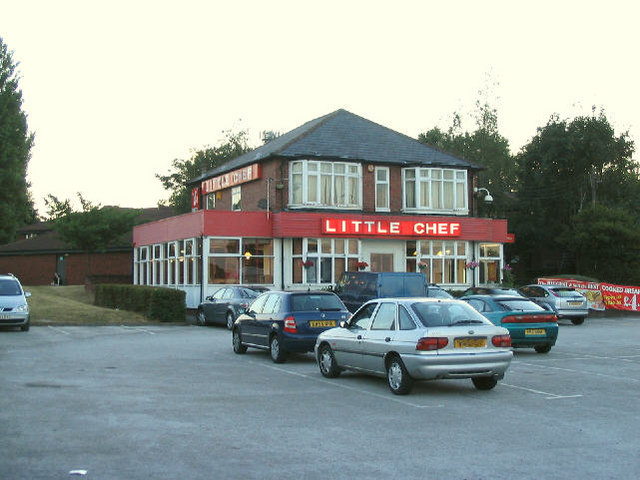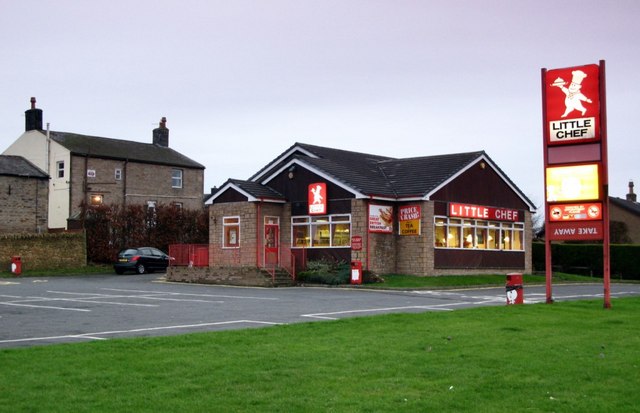In 1958, the British roadside witnessed the birth of a beloved institution: Little Chef. The brainchild of catering mogul Peter Merchant and caravan manufacturer Sam Alper, this chain was inspired by the burgeoning American diner culture they experienced during a business trip to the United States. Envisioning a similar concept tailored to the UK's growing number of car owners, they launched the first Little Chef in Reading, Berkshire. This modest 11-seat, prefabricated establishment began a journey that would see Little Chef become synonymous with road travel in Britain.

Peter Craine, CC BY-SA 2.0, via Wikimedia Commons
Early Years and Expansion
Little Chef's initial strategy was straightforward: provide motorists with reliable, affordable meals in comfortable settings. The diners were strategically located along major roads and quickly became popular among families and business travellers. The business model took advantage of Britain's expanding motorway network and growing car ownership, capturing a niche market that roadside pubs and cafes had yet to exploit fully.
The concept rapidly caught on, and by the early 1960s, Little Chef was expanding under the new ownership of Trust Houses Ltd, which later merged with Forte Group to become Trusthouse Forte. This partnership fueled rapid expansion and standardisation across the outlets. The typical Little Chef establishment featured easy access, ample parking, and a consistent menu offering full English breakfasts, hearty lunches, and satisfying dinners, all served in a family-friendly atmosphere.
112,113,118,122,125,126,131,116
Establishing a Brand
Under Trusthouse Forte, the Little Chef brand became a fixture on Britain's A-roads and motorways. The diners' architecture evolved from mobile and prefabricated structures to permanent brick buildings, characterised by their distinctive red and white branding and cheery chef logo. This period saw the introduction of the "Olympic Breakfast," a large, all-encompassing meal that promised to fill up travellers and became synonymous with the brand.
 Travelodge, Newmarket Rd by N Chadwick, CC BY-SA 2.0, via Wikimedia Commons
Travelodge, Newmarket Rd by N Chadwick, CC BY-SA 2.0, via Wikimedia Commons
Challenges and Changes
However, the 1990s brought significant challenges. Granada's acquisition in 1996 marked a shift in strategy. Granada saw potential in revitalising the brand to compete with the fast-food market, which was beginning to encroach on roadside diner territory. They introduced co-branded sites with Burger King and attempted to modernise the menu and interiors. Despite these efforts, the brand struggled to shed its increasingly outdated image as consumer preferences shifted towards quicker, more diverse food options.

Richard Croft / Sam Scorer, Little Chef
Decline
At the turn of the millennium, Little Chef grappled with identity and operational challenges. Ownership changed hands multiple times, and each new proprietor was trying to revamp the brand. A significant attempt was made when celebrity chef Heston Blumenthal was brought in to overhaul the menu and design of select branches as part of a Channel 4 documentary in 2008. While the changes received positive critical reception, they were implemented in only a handful of locations, limiting their impact.
The continued decline in visitor numbers and the financial crisis of 2007–2008 exacerbated the situation. Little Chef's offerings no longer align with the fast-paced, health-conscious trends dominating the food service industry. Moreover, competition from newly improved service station forecourts, which offered various fast food and coffee shop brands under one roof, diverted traffic away from standalone diner locations.
Final Years and Closure
By 2017, the brand was a shadow of its former self, with Euro Garages acquiring the remaining sites. This final transition marked the end of Little Chef's presence on Britain's roadsides, closing the chapter on a brand that had been a fixture of British travel culture for nearly 60 years.

Mike Quinn /The Little Chef on the A69 at Bardon Mill
Reflection and Legacy
The story of Little Chef is a poignant illustration of the dynamic nature of consumer businesses and the impact of changing societal trends. It reflects the broader narrative of post-war Britain's evolving road network and car culture, encapsulating a period when a roadside diner could be a cornerstone of family journeys and business trips. While it ultimately could not adapt quickly enough to changing tastes and competition, Little Chef's legacy endures in the memories of those who experienced its heyday.
In hindsight, could Little Chef have been saved? With fewer, better-invested locations and a more rapidly evolving service model, it might have continued to serve Britain's road users. Today, as we reflect on its rise and fall, we invite you to share your memories of Little Chef. Was it a nostalgic part of your travels, or do you believe it could have done more to adapt to the modern culinary landscape?
112,113,118,122,125,126,131,116





